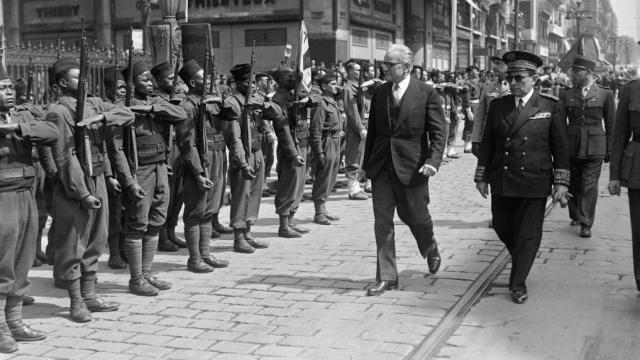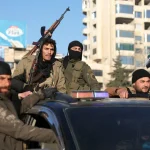On December 1, 1944, hundreds of West African soldiers who had fought for France during World War II were likely killed by the French army after they demanded the unpaid wages owed to them. In the fishing village of Thiaroye-sur-Mer, near Senegal’s capital Dakar, Biram Senghor honors the memory of these soldiers by regularly visiting a military cemetery, paying his respects at various anonymous graves where many of the victims are believed to be buried.
At 86, Senghor has no way of knowing exactly which grave belongs to his father, M’Bap Senghor, one of the riflemen presumed killed during that tragic day. The cemetery holds an unknown number of victims, and the details surrounding the massacre remain murky as Senegal commemorates the 80th anniversary of the event, which may exacerbate existing tensions between France and its former colony.
“I have fought for over 80 years to get answers,” says Senghor. “(French President Emmanuel) Macron cannot follow in the footsteps of his predecessors; France must repent.”
The West African soldiers were part of a unit known as “Tirailleurs Sénégalais,” colonial infantry in the French Army that fought in both World Wars. Historians note that disputes over unpaid wages led to the massacre, as French troops opened fire on unarmed African soldiers on December 1, 1944.
For decades, French authorities downplayed the events at Thiaroye. Initial military reports claimed that only 35 soldiers were killed in what was framed as a response to a “mutiny.” Other accounts estimated 70 casualties. However, many historians now believe the true death toll likely reached into the hundreds, with some estimates suggesting nearly 400 soldiers were killed based on the number of riflemen present at the camp that day.
Recently, Macron acknowledged the events in Thiaroye as a massacre for the first time in a letter to Senegal’s President Bassirou Diomaye Faye. “France must recognize that the confrontation that day between soldiers and riflemen demanding their due wages triggered a series of events resulting in a massacre,” Macron wrote.
Despite this recognition, some historians contest the notion of a confrontation, arguing that December 1 was an execution of unarmed soldiers. Martin Mourre, a historian and author of “Thiaroye 1944, History and Memory of a Colonial Massacre,” highlighted that no weapons were mentioned during trials of those accused of mutiny, and there were no reported injuries among French soldiers.
In his letter, Macron did not specify the number of soldiers killed during the massacre. The lack of transparency from French authorities regarding military reports and testimonies has contributed to the ambiguity surrounding the events.
French President François Hollande in 2014 transferred France’s archives on Thiaroye to Macky Sall, Senegal’s then-president. However, historians assert that key documents—including those revealing mass grave locations and the number of soldiers present on the day of the massacre—are still missing, raising questions about their existence and whether France holds them. Macron’s office and the French foreign ministry have not responded to requests for comment on this issue.
Under former President Macky Sall, little progress was made in allowing historians access to these important historical documents. “The archives remained inaccessible until this year, for unclear reasons,” Mourre noted.
Mamadou Diouf, a Senegalese historian leading this year’s Thiaroye commemoration committee, indicated that Sall was hesitant to delve into the matter to avoid straining diplomatic relations with France. However, new President Bassirou Diomaye Faye, elected in March, aims to reshape Senegal’s relationship with its former colonizer and has committed to ensuring that the narrative of Thiaroye is included in Senegal’s history.
Faye’s administration has organized extensive commemorations of the massacre from December 1 to April 2025 throughout the country. Political analyst Babacar Ndiaye notes that the goal is to make Thiaroye a central part of the national story, emphasizing visibility through media coverage to engage younger generations who may not be familiar with the events.
The 80th anniversary comes against a backdrop of declining French influence in the region, with Paris losing its grip on its former West African colonies. Recent years have seen French troops ousted from Niger, Mali, and Burkina Faso after assisting local forces against Islamic extremists. Furthermore, Chad recently ended a military cooperation agreement with France, one of the last countries in the region where France maintained a substantial military presence.
Currently, around 350 French troops remain in Senegal, primarily in a supportive role. Regarding their continued presence, Faye has suggested that it may not be desired by the Senegalese people.
Credit: ABC News




